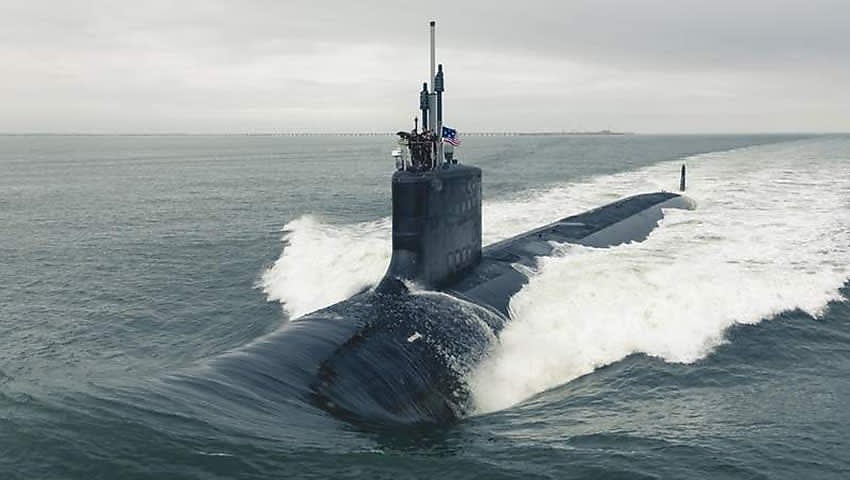The AUKUS agreement to bring nuclear-powered submarines to Australian shores is pulling the nation between two very different short and long-term strategic goals, according to an Australian strategic defence expert.
To continue reading the rest of this article, please log in.
Create free account to get unlimited news articles and more!
The three-party security pact between Australia, the UK, and the US is currently walking a tightrope between upgrading the Australian military capability and the immediate operational goal to get nuclear submarines as soon as possible, said John Blaxland, professor of international security and intelligence studies at the Australian National University’s Strategic and Defence Studies Centre.
The trilateral security partnership was announced by US President Joe Biden, then-UK Prime Minister Boris Johnson, and then-Prime Minister Scott Morrison in September 2021. Australian Deputy Prime Minister and Minister for Defence Richard Marles recently travelled to the United States for an AUKUS Defence Ministers meeting in December last year.
The agreement surfaced earlier this month with information that US Democratic Senator Jack Reed and Republican Senator James Inhofe have advised US President Joe Biden against plans to sell or transfer Virginia Class submarines to Australia ahead of the US Navy requirements.
AUKUS will need to be reconsidered “to avoid stressing the US submarine industrial base to the breaking point” and “turning into a zero-sum game for scarce, highly advanced (technology)”, wrote the two senators in the December 21 letter published by US website Breaking Defence on 5 January.
“There are some harsh realities. The US nuclear submarine baseline is at capacity and it’s not unreasonable for them to safeguard their own interests,” Professor Blaxland said.
“There’s an understandable nervousness of Australia to pick up the economic baton and not be an economic liability, as opposed to a net asset.
“(For example) the Australian Collins Class submarine was remarkably successful, but it took decades to get right and that was with conventional (diesel-electric) propulsion, not the far more complicated nuclear option.
“The US is taking a risk here and Australia needs to show it’s serious, not just with intent but a fair amount of money. This is a warning that there needs to be an energised response in Australia.”
The agreement is fast approaching the end of its 18-month preliminary planning phase and initial consultation is scheduled to end in March this year.
Beyond submarines, the long-term features of the agreement also include Australia acquiring long-range strike capabilities with Tomahawk cruise missiles to be fielded from Hobart Class destroyers, joint air-to-surface standoff missiles and long-range anti-ship missiles, collaboration on hypersonic missiles, precision strike guided missiles for land forces and accelerating $1 billion for a sovereign guided weapons manufacturing enterprise.
“AUKUS is more than submarine propulsion, it’s about resilience, hypersonic, AI and an advanced defence industry in Australia. To potentially be a bigger player in that space and our ability to contribute to the US and coalition resources,” Professor Blaxland said.
“In the past, we have had stop-and-start defence investments and we have had support from government for defence-related industries.
“It seems now that we have reasonable bipartisan support for a significant investment in muscling up the Australian defence industry in support of a more self-reliant defence position.”
Professor Blaxland said as China’s economic power continues to grow and tensions across the Taiwan Strait continue deteriorating, Australia’s defence capability could influence the region.
“AUKUS is more than just Taiwan, it has a bigger picture. Taiwan is the touchstone of China asserting expansionist behaviour into the Indian Ocean, South Pacific and South-East Asia,” he said.
“If Australia wants to have a deterrent effect on Chinese behaviour or contribute to a coalition deterrent effect, it will need bolstered capabilities.
“Countries right across Timor, New Guinea and Solomon Islands are doing their own calculations for their national interests and if Australia does not have something substantial to offer, then they will look elsewhere.
“That substantial offering would include robust military capabilities that have range, endurance and survivability.”

 Login
Login








